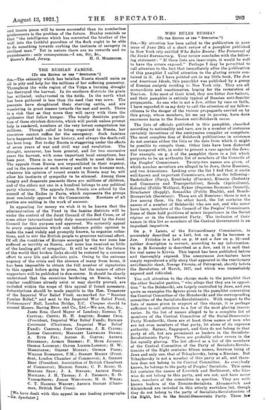THE RUSSIAN FAMINE.
[To THE Rosso& or sus " &neuron."' got,—The calamity which has befallen Russia should unite us all in pity and help for the millions of her suffering peasantry. Throughout the wide region of the Volga a burning drought has destroyed the harvest. In its southern districts the grain has withered, unharvested in the fields. In the north what has been gathered is less than the seed that was sown. The peasants have slaughtered their starving cattle, and are wandering in great masses towards the east and south. There is a risk that as they move they will carry with them the epidemics that follow hunger. The totally destitute popula- tion of these strieken districts, which will perish unless prompt help is rendered, numbers at the very lowest computation ten millions. Though relief is being organized in Russia, her resources cannot suffice for the emergency. Such famines have happened before in her history, and always the death-roll has been long. But to-day Russia is staggering under the effects of seven years of war and civil war and revolution. The drought, moreover, has been general, and for two successive years the harvest, with some important local exceptions, has been poor. There is no reserve of wealth to meet this need. The appeals from Russia are unparalleled in their urgency, and in the presence of such misery and want no humane man, whatever his opinion of recent events in Russia may be, will allow his instincts of sympathy to be silenced. Among these hungry and desperate peasants there are millions of children, and of the elders not ono in a hundred belongs to any political party whatever. The appeals from Russia are echoed by the council of the Exiles in Paris, which represents the groups most resolutely opposed to the Communists. Russians of all parties are uniting in the work of succour.
In appealing for money we wish it to be known that the administration of the Fund in the famine districts will be under the control of the Joint Council of the Red Cross, or of some other international. body duly commissioned by the Joint Council for this purpose and approved. We earnestly appeal to every organization which can influence public opinion to make the need widely and promptly known, to organize collec- tions, and to stir the British people to generous national effort. Of ell the countries of Europe scourged by the war none has suffered so terribly as Russia, and none has received so little of the healing gift of sympathy. It will be wall for the future of the world that broken links should be restored by a common effort to save life and alleviate pain. Owing to the extreme urgency of the crisis and the absence of many from home, it has been impossible to obtain the full number of signatories to this appeal before going to press, but the names of other supporters will be published in due course. It should be clearly understood that the countries bordering on Russia, where similar conditions already oust or may shortly prevail, are included within the scope of this appeal if found necessary. Subscriptions should be made payable to the Hon. Treasurer of the Imperial War Relief Fund, earmarked for " Russian Famine Relief," and sent to the Imperial War Relief Fund, Fishmongers' Hall, London Bridge, E.C. Cheques should be crossed Messrs. Baring Bros. and Co., Ltd.—We are, Sir, lec.,
JAMES Rona (Lord Mayor of London); RANDALL T. CANTUAR; CREWE; H. H. ASQUITH; ROBERT CECIL (President, Imperial War Relief Fund); RICHARD CAVENDISH (Chairman, Imperial War Relief Fund); CARNOCK; JOHN CLIFFORD; J. R. CLYNES; LOUISB CREIGHTON; MARGARET LLEWRLLYN DAVIES; A. Burs FRY; ALFRED E. GARVIB; ARTHUR HENDERSON; AUBREY HERBERT; F. HUTH JACKSON; GEORGE LANSB17RY; OLIVER LOCKER-LAYPSON; H. W. MASSINGHAM; GILDERT MURRAY; GEORGE DAME; WILLIAM ROBERTSON, F.M.; STANLEY MACHIN (Presi- dent, London Chamber of Commerce); A. Sumter BEEN (President, Association of British Chambers of Commerce); MICHAEL SADLER; C. P. SCOTT; G. BERNARD SHAW; J. A. SPENDER; ARTHUR STEEL- MAITLAND; J. H. THOMAS; J. J. THOMSON; R. 0. V./isms-Serra; JOSIAH WEDGWOOD; II. G. WELLS; C. T. HAOBERO WRIOHT; ARTHUR STANLEY (Chair- man, British Red Cross).
[We have dealt with this appeal in our leading paragraphs. —En. Spectator.]


































 Previous page
Previous page